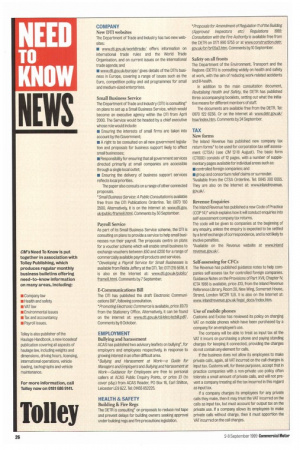COMPANY
Page 28

If you've noticed an error in this article please click here to report it so we can fix it.
New DTI websites The Department of Trade and Industry has two new websites: • www.dti.gov.uk/worldtrade/ offers information on international trade rules and the World Trade Organisation, and on current issues on the international trade agenda; and • www.dtlgov.uk/europe/ gives details of the DTI's business in Europe, covering a range of issues such as the Euro, competition policy and aid programmes for small and medium-sized enterprises.
Small Business Service The Department of Trade and Industry (DTI) is consulting' on plans to set up a Small Business Service, which would become an executive agency within the DTI from April 2000. The Service would be headed by a chief executive whose role would include: • Ensuring the interests of small firms are taken into account by the Government; • A right to be consulted on all new government legislation and proposals for business support likely to affect small businesses;
II Responsibility for ensuring that all government services directed primarily at small companies are accessible through a single local outlet;
• Ensuring the delivery of business support services reflects local priorities.
The paper also consults on a range of other connected proposals.
Small Business Service: A Public Consultation is available free from the DTI Publications Orderline. Tel: 0870 150 2500. Alternatively, it is on the Internet at: www.dti.gov, uk/public/frame8.html. Comments by 30 September.
Payroll Service As part of its Small Business Service scheme, the DTI is consulting on plans to provide a service to help small businesses run their payroll. The proposals centre on plans for a voucher scheme which will enable small business to exchange vouchers between 250 and 2200 for a range of commercially available payroll products and services. Developing a Payroll Service for Small Businesses is available from Relda Jeffery at the DTI. Tel: 0171215 5618. It is also on the Internet at: www.dti.gov.uk/peblic/ frame8.html. Comments by? September.
E-Communications Bill The DTI has published the draft Electronic Communications Bill', following consultation.
'Promoting Electronic Commerce is available, price £9.70 from the Stationery Office. Alternatively, it can be found on the Internet at: www.dti.govuktii/elec/ecbill.pdf/. Comments by 8 October.
EMPLOYMENT Bullying and harassment
ACAS has published two advisory leaflets on bullying', for employers and employees respectively, in response to growing interest in an often difficult area.
* Bullying and Harassment at Work—a Guide for Managers and Employers and Bullying and Harassment at Work—Guidance for Employees are free to personal callers at ACAS Public Enquiry Points, or price 21 (to cover p&p) from ACAS Reader, PO Box 16, Earl Shitton, Leicester LE9 8ZZ. Tel: 01455852225.
HEALTH &SAFETY Building & Fire Regs
The DETR is consulting* on proposals to reduce red tape and prevent delays for building owners seeking approval under building regs and fire precautions legislation.
'Proposals for Amendment of Regulation 11 of the Building (Approved Inspectors etc) Regulations 1985: Consultation with the Fire Authority is available free from the DETR on 0171 890 5753 or at www.construction.detr. gov.uk/br/brO5a3.htm. Comments by 10 September.
Safety on all fronts
The Department of the Environment, Transport and the Regions (DETR) is consulting widely on health and safety at work, with the aim of reducing work-related accidents and ill-health.
In addition to the main consultation document, Revitalising Health and Safety, the DETR has published three accompanying booklets, setting out what the initiative means for different members of staff.
The documents are available free from the DETR. Tel: 0870 122 6236. Or on the Internet at: www.detr.gov.uk/ hsw/index.htm. Comments by 24 September.
TAX New forms
The Inland Revenue has published new company tax return forms' to be used for corporation tax self assessment (CTSA) (see CM 12-18 August). The basic form (CT600) consists of 12 pages, with a number of supplementary pages available for individual areas such as:
• controlled foreign companies; and
• group and consortium relief claims or surrender. 'Available from the CTSA Orderline. Tel: 0845 300 6555. They are also on the Internet at: www.inlandrevenue. gov.uk/.
Revenue Enquiries The Inland Revenue has published a new Code of Practice (COP 14)* which explains how it will conduct enquiries into self-assessment company tax returns.
The code will be given to companies at the beginning of any enquiry, unless the enquiry is expected to be settled by a brief exchange of correspondence, and is not likely to involve penalties.
'Available on the Revenue website at www.inland revenuelov.uk/.
Self-assessing for CFCs
The Revenue has published guidance notes to help companies self-assess tax for controlled foreign companies. Guidance Notes on the Provisions of Part XVII, Chapter IV, ICTA 1988 is available, price 210, from the Inland Revenue Reference Library, Room 28, New Wing, Somerset House, Strand, London WC2R 1LB. It is also on the Internet at: www. inlandrevenue,gov.uk/legal_docs/index.htm.
Use of mobile phones
Customs and Excise has reviewed its policy on charging VAT on mobile phones which have been purchased by a company for an employee's use.
The company will be able to treat as input tax all the VAT it incurs on purchasing a phone and paying standing charges for keeping it connected, providing the charges do not contain any element for calls.
If the business does not allow its employees to make private calls, again, all VAT incurred on the call charges is input tax. Customs will, for these purposes, accept that in practice companies with a non-private use policy often tolerate a small amount of private calls, and will not prevent a company treating all the tax incurred in this regard as input tax.
If a company charges its employees for any private calls they make, then it may treat the VAT incurred on the calls as input tax, but must account for output tax on the private use. If a company allows its employees to make private calls without charge, then it must apportion the VAT incurred on the call charges.








































































































